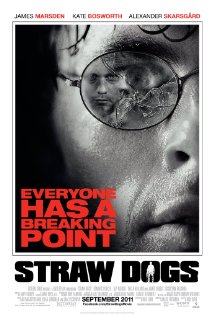
STRAW DOGS
US, 2011, 110 minutes, Colour.
James Marsden, Kate Bosworth, Alexander Skarsgaard, James Woods, Dominic Purcell, Walter Goggins.
Directed by Rod Lurie.
Straw Dogs was originally made in 1971 by celebrated director, Sam Peckinpah, noted for his on-screen violence, especially in westerns. This was a story set in the British countryside, and is now transferred to the deep South, to Mississippi.
The basic plot outline is that an author and his wife go to her home town so that he can write a screenplay. He employs his wife’s former sweetheart, and the football champion of the town, to get his friends to repair the house. They have thuggish attitudes and behaviour, continually taunting the author, the physical versus the intellectual. Also an influence on the town is the former football coach, now an alcoholic, who has a set against a mentally impaired man, accusing him of molesting his daughter.
When the men challenge the author to go out hunting with them, they leave him stranded and take the opportunity to rape his wife. This leads to a revenge scenario, the man defending the mentally impaired man as well as his wife, a vengeance and revenge story.
There is no doubt as we watch this film about the rights and wrongs of all the characters. The early version, there was greater complexity and challenge to audiences to think through their attitudes. This has been a great criticism of the remake, many considering it unnecessary and reduced simply to a revenge story for DVD release.
In the roles taken by Dustin Hoffman and Susan George, there are James Marsden and Kate Bosworth. The coach is played by James Woods, the leader of the thugs by Alexander Skarsgaard and the mentally impaired man by Dominic Purcell.
The film was written and directed by Rod Lurie, a former critic, who made a great impact with his film The Contender in 2000. He also made the intriguing Resurrecting the Champ with Samuel L. Jackson and Josh Hartnett.
1. The 21st century and the deep South, Mississippi, rednecks, intellectuals, the clash? Sexual politics? Rape and abuse? Vengeance?
2. Comparisons with the original film by Sam Peckinpah? From 1971? 40 years later? Treatment of themes? A more explicit era? The contrast between more subtlety of the past than straightforward presentation of characters and situations?
3. The title, the explanation?
4. Mississippi, location photography, the town, streets and buildings, the football field, homes? The countryside? The musical score?
5. David and Amy, their marriage, each of their characters, commitment to each other, love? The decision to go to Amy’s home town? David and his wanting to write the screenplay about Stalingrad? His Jaguar, credit cards, glasses, walking out of church? Amy coming back to people she knew, especially Charlie and her relationship with him in the past? His claiming that she still loved him?
6. An intellectual and sophisticated couple coming to stay in this town? Setting up the house? The repairs? Charlie and his friends, their work? The bear trap – and its later being used against Charlie, his death? Their behaviour, comments, criticising David, his manhood? Coarse minds and mouths? Their work on the, house, arguments, roughhouse?
7. The football coach, his place in the town, influence, leadership, drinking? David in the bar and his reaction? His daughter? Her coming on to Niles? The criticism of Jeremy Niles? His favouritism towards Charlie? Urging them on to their violence?
8. The football games in the crowd mentality?
9. Jeremy Niles, simple, in the care of his brother, a big man, the coach seeing him as a threat to his daughter? His response to the coach’s daughter, strangling her? On the road, hit by David?
10. Challenging David to go hunting with them, his agreeing, his motivation, his reactions against the taunts? Their leaving him alone in the woods?
11. Going into the woods, allegedly hunting, hunting Amy, the brutality of the rape?
12. David, Amy not telling him, his challenge to the men, defending Jeremy, defending his wife?
13. The siege of the house? The group? The coach and his attack on the policeman, the black policeman, his death?
14. The violence, visual, guns, blood? David and his shooting the coach, the other man? Amy and her shooting?
15. The motivation, violence and revenge? Self-affirming as a man?
16. The more straightforward melodramatics of this telling of the story than the drama and complexity of the original?